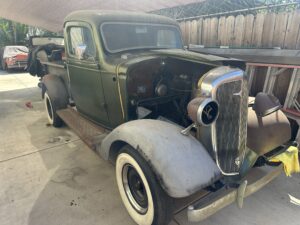
This 1936 Chevrolet Pick up VIN Verification was done by our team member in Rancho Cucamonga, Ca. on 09-04-2025

This 1936 Chevrolet Pick up VIN Verification was done by our team member in Rancho Cucamonga, Ca. on 09-04-2025
The 1936 Chevrolet Pickup—part of Chevrolet’s FB half-ton truck series—stands as a classic emblem of pre-war American design. Notable for its bold Art Deco styling, solid build, and dependable performance, it served as both a hardworking farm vehicle and the canvas for today’s beloved collector restomods.
Introduced as part of the Master Series, the FB chassis was used across Chevrolet’s 1936 trucks, including models like the Canopy Express—which featured a steel cab, side-mount spare, hydraulic brakes, and a refined automotive-style dashboard. That year marked Chevrolet’s best-ever annual truck registrations, surpassing 200,000.
These pickups were powered by Chevrolet’s renowned “Stovebolt” inline-six: around 206.8 cu in, producing 72–79 hp and up to 155 lb-ft torque. The driveline included a 3-speed manual transmission (some panel variants offered a 4-speed), and the truck rode on leaf springs and rigid axles with hydraulic drum brakes
Exterior: One-piece stamped cab (low-roof or high-roof), hood louvers, horizontal Bowtie emblem, and optional canvas canopy tops, especially on Canopy Express models
Interior: Simplified yet functional—wooden bed, basic bench seat, and dashboard gauges arranged for speed, fuel/temp, and ammeter/oil pressure
The FB platform included multiple variations:
Half-ton Pickup (standard)
Panel Delivery
Canopy Express (with side-drop curtains and cargo versatility)
Variants came in high- or low-roof cabs, wheelbases from 112–157 inches, and payloads up to 1.5 tons
Technologically ahead of many rivals, the 1936 Chevy introduced:
Hydraulic brakes (a first for Chevy trucks)
All-steel cab
Dashboard styling more aligned with Chevy cars
While not a priority in 1936, the truck had moderate efficiency:
Estimated 10–15 mpg, aided by lightweight construction and simple powertrain
Against competitors like Ford, Chevy offered more modern features such as hydraulic brakes and a more refined interior. The Stovebolt engine provided smoother delivery and better torque than many flathead rivals of the era
Original MSRP: Around $515 for the Canopy Express variants, similar or slightly less for standard pickups
Collector Market: Restored and custom models trade between $20,000–$65,000, occasionally higher for ultracustom versions
The 1936 Chevy Pickup helped define Chevrolet’s truck identity in the pre-war era.
Its hydraulic brake system, durable construction, and classic lines have made it a favorite for restoration and hot-rodding.
As one barn-find owner reflected, despite wartime and daily use, these trucks could endure decades with resilience and care
“The stove-bolt engine… simple, rugged, and torque-rich—built for the real American work.” (Common enthusiast sentiment)
Need a VIN Verification? We are licensed to complete the REG 31 form. Call to get your car, truck or motorcycle verified today!
© 2025 QUICK VIN VERIFICATION. All rights reserved.